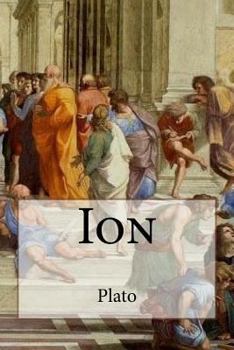Ion
Select Format
Select Condition 
Book Overview
In Plato's Ion Socrates discusses with Ion, a professional rhapsode who also lectures on Homer, the question of whether the rhapsode, a performer of poetry, gives his performance on account of his skill and knowledge or by virtue of divine possession. It is one of the shortest of Plato's dialogues.
Format:Paperback
Language:English
ISBN:1534810994
ISBN13:9781534810990
Release Date:June 2016
Publisher:Createspace Independent Publishing Platform
Length:28 Pages
Weight:0.11 lbs.
Dimensions:0.1" x 6.0" x 9.0"
Customer Reviews
1 rating
For the sake of philosophy, Plato would ban poetry
Published by Thriftbooks.com User , 15 years ago
I read this book for a graduate seminar on the philosophy of art. Plato in his dialogues "Ion, Symposium, and The Republic" was very concerned by the kinds of values presented in Greek poetry. By values, he meant proper and improper ways of acting, behaving, feeling, and thinking and ways of living. Plato thought poets and Homer were educating Greeks with bad values. Especially since Homeric epics were the primary vehicle used for educating the youth language and cultural notions, thus Plato hated this. This was an important battle for Plato, because of poetry's bad teachings; he was trying to contest the status of Greek poetry in the culture. However, Aristotle says in his "Poetics," if we take a look at Greek poetry on its own terms, in terms of what it was actually doing not in terms of how we are going to approach this as poetry; then we are going to approach this as though the poetry is presenting a way of living, a way of seeing, a way of being, seriously. What this means to the philosophy of art is that this would be different from looking at art in a particular way of thinking and producing. Once that is the case, and you read the poems on their own terms, you come out with a pretty wild world, you come out with a world that is quite unusual. It is from this standpoint that Plato's critique of poetry should seem more amenable, because he was complaining about these wild and strange elements; "saying this is no way to understand human existence, there are better ways of understanding human existence." Plato wants what are familiar terms to us like justice, and rationality, self-activation taught; these concepts are not found in Greek poetry. He wants to revolutionize how human existence is seen. Plato sees Homer as a tragic poet because heroic exploits are always matched with death and limits. The tragic conception of poetry in Plato's eyes is heavy handed and unworthy. Art was understood as a facet of culture for moderns and an engine of culture for the Greeks. Poetry was not an entertainment option for ancient Greeks; it was their cultural lens through which the Greeks understood themselves. Moreover, the reason why poetry was important was because it had religious elements in terms of stories of the Gods and heroes, and particular forces. We shouldn't understand fate as predestination. The Greeks had a polytheistic spontaneous, fluid, ever activating religious sensibility. It was not organized by any set of doctrines or cannons, priests. It was all over the place. What is remarkable about Homer and Greek tragedy is that these stories don't make humans into puppets of the Gods. One of the reasons for this is that because of polytheism, there is no religious predestination as one would have with monotheistic Christianity or Judaism. The poetry is presenting a very unusual world where there are multiple sites of divine power causing conflicts with each other. That is why we have stories were the Gods and Godde





